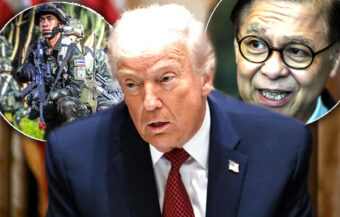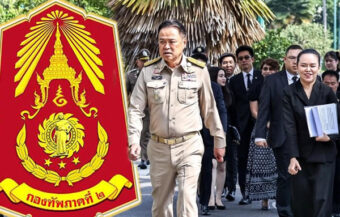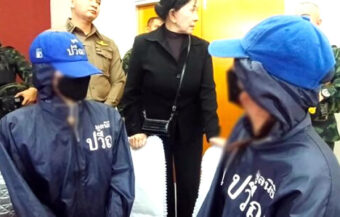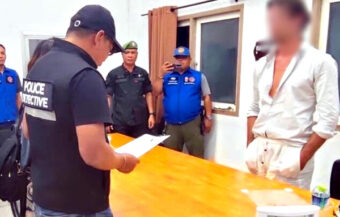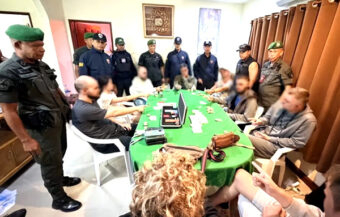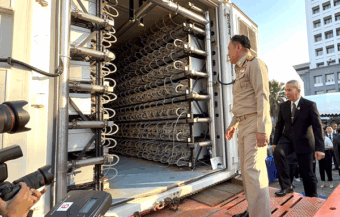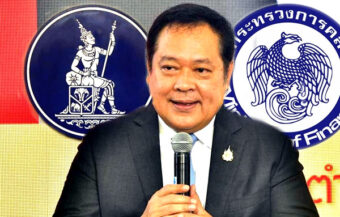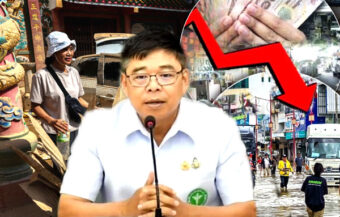Palang Pracharat Party leader General Prawit Wongsuwan pushes to cancel MOU 44, accusing it of legal flaws and violating Thailand’s sovereignty over contested maritime resources with Cambodia, raising tensions amid political battles and national interests.
The unfolding legal and political drama in the Gulf of Thailand over maritime resources between Thailand and Cambodia is certainly being seen as a political power game. However, the eventual development of such valuable resources does warrant an attempt at reaching an agreement on the issue. However, this week, the Palang Pracharat Party made clear its strong opposition to the 2001 Memorandum of Understanding (MOU) known as MOU 44. Both the party leader General Prawit Wongsuwan and Secretary-General Paiboon Nititawan explained why the agreement is fraught with legal risks for both Thailand and the Pheu Thai-led government of Paetongtarn Shinawatra.
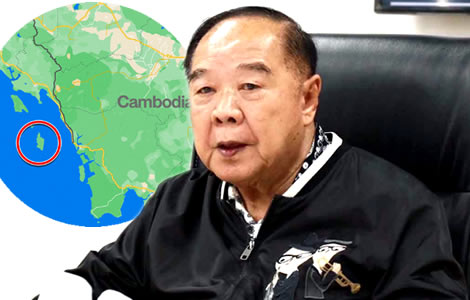
General Prawit Wongsuwan, leader of the Palang Pracharat Party (PPRP), is calling for the cancellation of Memorandum of Understanding (MOU) 44 between Thailand and Cambodia.
Signed in 2001, the deal divides energy resources in the Gulf of Thailand. The Palang Pracharat Party at this time argues that the agreement is unconstitutional and legally flawed.
The disputed Gulf of Thailand maritime territory spans about 26,000 square kilometres, an area long contested by Thailand and Cambodia.
General Prawit Wongsuwan calls for the cancellation of MOU 44, citing unconstitutionality and legal flaws
Both nations claim parts of this territory, with submissions dating back to 1971 and 1972. Despite his involvement in negotiating MOU 44, General Prawit now questions its legality under Thailand’s 2017 Constitution.
On November 7, 2024, Paiboon Nititawan, Secretary-General of the Palang Pracharat Party, revealed the party’s push to annul the agreement. At length, Paiboon emphasised that the move is meant to protect Thailand’s sovereignty and its energy resources. In particular, he highlighted that the resources in question are worth an estimated ฿20 trillion. In short, wealth that Thailand and its people are entitled to under international law.
General Prawit earlier admitted he chaired the committee that negotiated MOU 44. However, he claims he was previously unaware of its potential legal issues.
General Prawit raises concerns about MOU 44 violating international law and Thai constitutional rules
For instance, it wasn’t until June 2024 that he became convinced the agreement violated both domestic and international laws. Paiboon explained that General Prawit identified two key constitutional issues that could invalidate the MOU.
The first issue involves the Cambodian government’s actions concerning the continental shelf. International maritime law dictates the boundaries of a nation’s continental shelf.
Significantly, these are essential for claiming marine resources. Cambodia’s line starts at the 73rd marker along the land border with Thailand and cuts through Thai territory.
Certainly, he insists, that includes Ko Kood, a Thai island. The line, according to the Palang Pracharat Party, undoubtedly violates international maritime law.
Paiboon argued that MOU 44 endorses Cambodia’s territorial claim, which contradicts international agreements on maritime boundaries.
Palang Pracharat Party warns that negotiations on MOU 44 could illegally divide Thailand’s resources
If the agreement proceeds, Cambodia could claim 26,000 square kilometres of maritime territory that Thailand presently considers its own.
General Prawit expressed concern that continuing negotiations based on MOU 44 violates both international maritime law and Thai domestic laws.
Certainly, this includes the Royal Decree that defines Thailand’s continental shelf. Paiboon added that continuing the agreement would involve dividing Thailand’s natural energy resources with Cambodia, which could be illegal.
The second legal issue concerns MOU 44’s status as a treaty or contract. According to the Palang Pracharat Party, the agreement alters Thai territory and sovereignty.
Under the Thai Constitution, such agreements must be approved by Parliament. Paiboon points out that MOU 44 was never submitted to Parliament for approval when it was signed.
The failure to ratify MOU 44 through Parliament renders it illegal under the Thai Constitution
The Thai Constitution of 1997, 2007, and 2017 all require parliamentary approval for treaties or agreements that affect national territory.
Since MOU 44 was never ratified, Paiboon insists it is illegal and void. He warned that if the government continues to honour the MOU, it could face legal challenges for violating the Constitution.
The Palang Pracharat Party’s push to annul MOU 44 comes amid rising political tensions. General Prawit’s party was excluded from the government formed by Paetongtarn Shinawatra in September 2024.
This exclusion has fueled a nationalistic campaign, particularly over Thailand’s relationship with Cambodia.
A key issue is the historical connection between former Prime Minister Thaksin Shinawatra and Cambodia’s long-time leader, Hun Sen.
Thaksin, who fled Thailand to avoid legal prosecution and was later appointed an economic advisor to Cambodia.
Palang Pracharat Party criticises Thaksin Shinawatra’s role in Cambodia and accuses the Pheu Thai Party of undermining Thailand’s sovereignty
That move certainly sparked controversy in Thailand. The Palang Pracharat Party has now seized on this. In brief, it is accusing Thaksin of undermining Thailand’s sovereignty and interests in the Gulf of Thailand.
Thaksin’s ties to Hun Sen are seen by critics as part of a broader strategy to exploit Cambodia’s resources at Thailand’s expense.
Despite these efforts, the political campaign to cancel MOU 44 has not significantly shifted public opinion. Paetongtarn Shinawatra, the current Prime Minister, remains popular with the Thai public. Many expect her government to endure in the short term.
The debate over Thailand’s energy resources in the Gulf of Thailand has been fanned by the Palang Pracharat Party. Certainly, it is a political move that runs the risk of taking on a life of its own.
The Palang Pracharat Party has made clear its goal to legally challenge MOU 44. Secretary-general Paiboon Nititawan has already lost one case before the Constitutional Court but remains determined to continue pressing the issue.
Need for a definitive legal agreement on maritime resources between Thailand and Cambodia
The Palang Pracharat Party, in short, believes that the MOU threatens Thailand’s sovereignty.
However, other international examples show that such disputes can be resolved. Ultimately, a definitive and legal agreement will be required between the two countries.
Large investments by firms, including Thai-owned concerns, will still require a firm legal basis. Ultimately, this will require a clearer maritime agreement between the countries.
Ko Kood at the centre of Thailand’s rising political storm waged against Paetongtarn’s government
Prime Minister Paetongtarn holds urgent talks and briefings to diffuse the rising Ko Kood controversy
An example of how such disputes can be resolved is the October 2022 agreement between Israel and Lebanon. Despite both countries being effectively at war, a deal was brokered and guaranteed by the United States.
This cleared the way for a French firm to begin oil and gas exploration in the area, with the disputed waters apportioned between Israel and Lebanon.
Join the Thai News forum, follow Thai Examiner on Facebook here
Receive all our stories as they come out on Telegram here
Follow Thai Examiner here
Further reading:
Ko Kood at the centre of Thailand’s rising political storm waged against Paetongtarn’s government
Pressure mounts again on PM Paetongtarn as the Constitutional Court seeks AG’s input on complaint
Ung Ing papers over the cracks of a cabinet which is already divided after only six weeks in office
Firebrand Jatuporn launches crusade against Thaksin Shinawatra and present government in Bangkok
Political storm brewing as the country’s leading parties struggle to reform the 2017 Constitution
Prime Minister Paetongtarn is the people’s favourite for the top job according to latest NIDA poll
Government is already divided as the PM shelves efforts at amending the 2017 Constitution on ethics
People’s Party on campaign but on guard against potential legal complaints to oversight agencies
Wealthy young People’s Party leader aims to create a technology-driven and efficient welfare state

